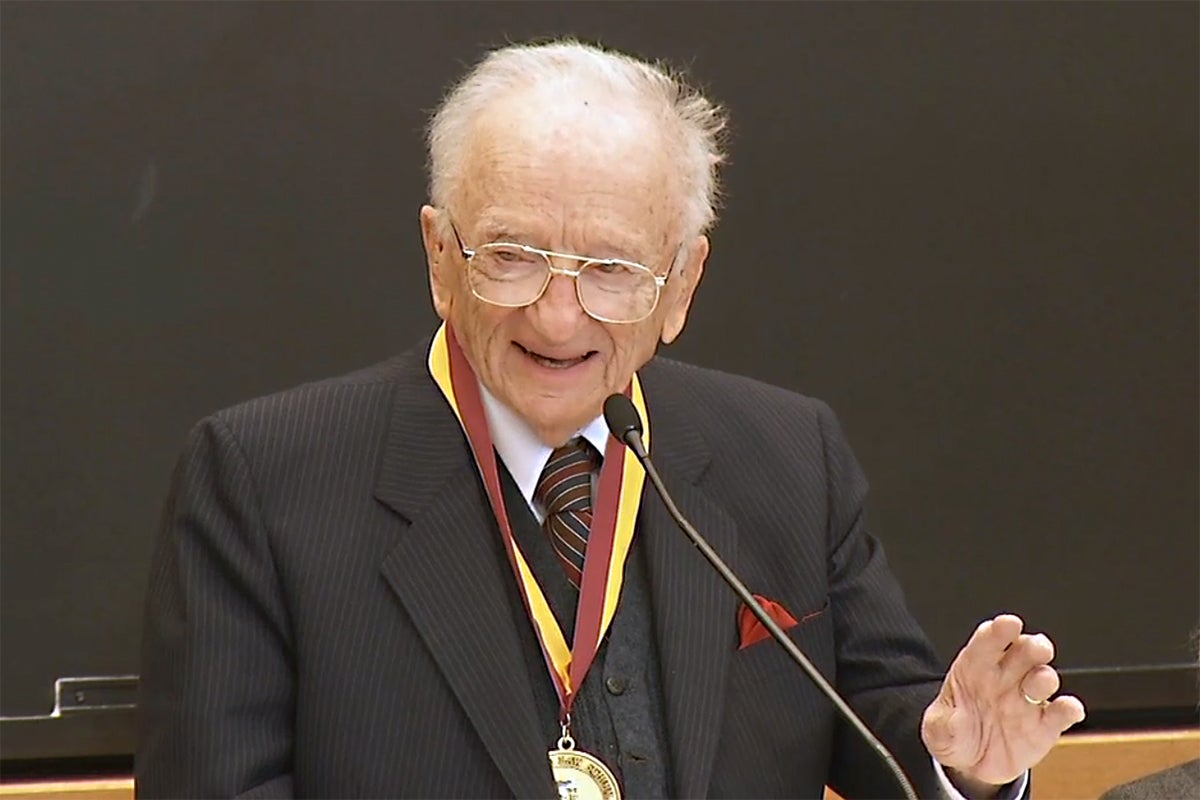Benjamin B. Ferencz ’43, known for his role as chief prosecutor in the Nuremberg Trials and for his work promoting an international rule of law and the creation of an International Criminal Court, has been awarded Harvard Law School’s highest honor: the Medal of Freedom.
The award, established to commemorate the achievements of individuals who have worked to uphold the legal system’s fundamental commitment to freedom, justice, and equality, was presented by Dean Martha Minow during a ceremony on Friday, Nov. 7 at Harvard Law School. Minow thanked Ferencz for a lifetime’s work “advocating for accountability and justice.”
As part of the event, the 94-year-old Ferencz delivered a talk titled “Law not War,” in which he advocated steps to replace the “rule of force with the rule of law.” Ferencz’s talk, which drew a standing-room only crowd, was sponsored by Harvard Law School’s Human Rights Program.
Past recipients of the HLS Medal of Freedom include the Brown v. Board of Education litigation team, South African President Nelson Mandela, Army Brigadier General Mark Martins ’90, and Chief Justice of Pakistan Iftikhar Chaudhry.
In 1947, at the age of 27, Ferencz served as chief prosecutor for the U.S. in the Einsatzgruppen Case at the Nuremberg Tribunal, in which 22 Nazi officials, including six generals, were charged with murdering more than 1 million people. All were convicted, and 13 were sentenced to death.
The International Military Tribunals at Nuremberg are widely regarded to have changed the course of history. The term “genocide” was coined during the tribunals and the concept of crimes against humanity began to emerge. Harvard Law School Library’s “Nuremberg Trials Project” has approximately one million pages of documents relating to the trial.
Born in Transylvania in 1920, Ferencz immigrated to the U.S. with his family when he was ten months old. Growing up in Manhattan, he studied crime prevention at the City College of New York before attending HLS.
After completing his studies, Ferencz joined the U.S. Army, where he served in the 115th AAA Gun Battalion, an anti-aircraft artillery unit. In 1945, he was transferred to the headquarters of General Patton’s Third Army, where he was assigned to a newly created War Crimes Branch tasked with collecting evidence of Nazi brutality and apprehending the criminals. In that capacity, he was sent to the concentration camps as the prisoners were being liberated.
Ferencz was honorably discharged from the Army at the end of 1945 and returned to private practice in New York. Soon after, he was recruited for the Nuremberg war crimes trials, which were already in progress.
After the Nuremberg Trials, Ferencz returned to private practice for 13 years. Influenced by his previous experience in WWII and by the Vietnam War, he devoted himself to the creation of an International Criminal Court. He was an adjunct professor of international law at Pace University from 1985 to 1996, and he published several books arguing for an international legal system, including: “Defining International Agression: The Search for World Peace” (1975), “An International Criminal Court: A Step Toward World Peace” (1980), “Enforcing International Law: A Way to World Peace” (1983), and “PlanetHood” (1988).
In the late 1990s, Ferencz began to see his dream come to fruition: the international community began debating the creation of an International Criminal Court. The United Nations General Assembly adopted a statute establishing the court in 1998 in Rome. In 2002, the Rome Statute was entered in force. Ferencz has since been active at Preparatory Commission sessions for the ICC, monitoring and making available his expertise on current efforts to define aggression.
Learn more on his website: http://www.benferencz.org/
